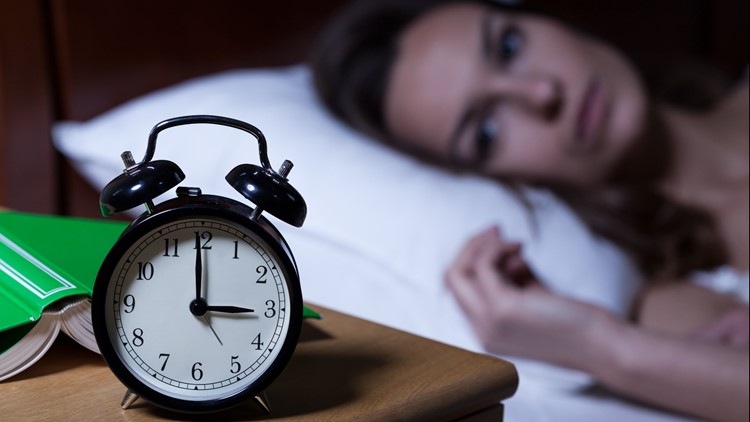ST. LOUIS — Waking up at 3 a.m. every night is common, so the first thing is to not stress about it. If you worry about being awake, it’ll only make it worse, sending you into a vicious cycle that looks like this: anxiety-insomnia, insomnia-anxiety.
There are three common culprits for the 3 a.m. awakenings, depending on your lifestyle and gender. They are stress, diet and hormones. The first two can drop your blood sugar in the middle of the night, causing you to wake up. This is when stress hormones are stimulated to raise your blood sugar back to a safe level. As you awaken, you may notice your heart is beating faster, and your blood pressure increases, according to LifeStance Health.
The wake-up call
When you wake up consistently at 3 a.m. and it’s related to stress, it can be a wake-up call. A wake-up call is realizing you need to pay attention to something, act to change a situation, or decide something you’ve been on the fence about. Regardless of what needs to happen, your body will communicate to get your attention. In this case, the 3 a.m. awakening might be accompanied by headaches, vertigo and other signs of stress, according to the Cleveland Clinic.
Unstable blood sugar
When you go to sleep, your brain is still working hard. If you go too long without food, your blood sugar can fall too low. This is no good for your brain that depends on glucose for energy, according to MentalHelp.
To test whether unstable blood sugar issues are waking you up, experts recommend eating a small snack that includes protein and fat like nut butter (peanut or almond) to see if you fall back to sleep.
Registered dietitian Jennifer McDaniel cautioned against using this method as a crutch to get to sleep, but said as a test make sure to eat something that’s easily digestible.
“I would advise eating a banana, piece of toast, or bite or two of yogurt,” she said. “Solid fats take longer to digest and can interfere with sleep quality.”
As the owner of McDaniel Nutrition Therapy, McDaniel works with people to develop personalized nutrition plans.
She said a better idea is to invest in a blood sugar meter to test your levels then talk to your doctor. You may need to change the way you eat overall by adapting a diet equipped to stabilize your blood sugars.
“Assuming the individual does not have diabetes, tips to prevent nighttime low blood sugars include avoiding alcohol, ensuring your carb intake comes from high-fiber, less processed sources and not skipping dinner,” she explained.
High-quality carbs include plant-based wholegrains like brown rice, oats, farro, whole-wheat pasta and fruits and vegetables.
“For breakfast, build a base with a hefty dose of protein such as eggs or Greek yogurt,” McDaniel advised. “Include healthy fats like seeds or nuts and focus on wholegrains, like oats. Skip highly processed, high-sugar starts like pancakes and pastries.
“What we know from research is that enough, but not too much, protein in the diet may support sleep quantity and quality,” McDaniel said. “A diet similar to the Mediterranean diet filled with fiber, plants and low-saturated fats seems to contribute to better sleep duration and quality as well.”
Perimenopause and menopause
If you’re a woman 40 to 59, consider hormonal changes due to perimenopause and menopause as the reason you’re waking up before you want to. Insomnia, early morning awakenings, hot flashes, palpitations and night sweats are symptoms that occur when the production of certain hormones shift. Night sweats in particular are the reason why 56% of perimenopausal women sleep fewer than seven hours a night. Talk to your doctor about hormone replacement therapies, like progesterone and DHEA. Insomnia is also common with pregnancy.
Resources:
Sleep series:
Jackie Barnes, Ph.D., LCSW, is a freelance health writer, medical family therapist, consultant and professor. When she’s not practicing and promoting holistic health, she’s working on one of her many creative projects.



